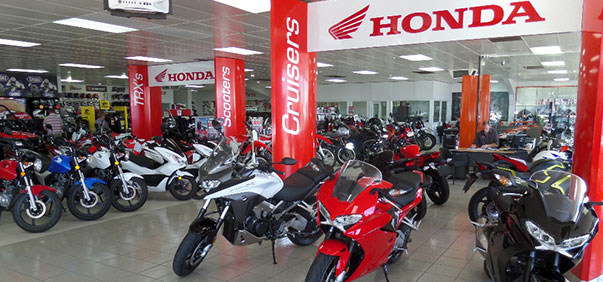
PLEASE NOTE: WE DO NOT PROVIDE THESE SERVICES, THIS POST IS FOR INFORMATION ONLY - ALSO RULES AND REGULATION DO CHANGE
There's no question, having a scooter/motorbike makes life much easier, and if you are going to settle in Thailand for a period of time longer than 6 months, it also makes good economic sense to purchase one.
Who can buy a Motorbike in Thailand?
Anyone can buy a Motorbike in Thailand - it just takes money! But to register a Motorcycle in your own name, Foreigners will need some paperwork, but this is not as difficult as it might at first seem.
How to Buy a Motorbike
Firstly, you'll have to decide whether you want a scooter or an actual motorbike. Unless you're already a serious motorcyclist, then you'll find a scooter is far more practical as well as being way cheaper.
As to which scooter to buy it doesn't really matter that much as they are all pretty much the same, all cheap to run, very reliable and low maintenance, so you mostly pick the one that looks nicest and is a good price.
Almost all the bikes to choose from will be either Honda or Yamaha, and come in three engine size: 110cc, 125cc and 150cc. Not surprisingly the smaller ones are generally cheaper and the larger ones more expensive. If you are of larger stature and/or you intend to ride in a hilly area then you should consider the large engines, but for most people it does not really make that much difference.
NOTE: The reason that there is the seemingly pointless size of 110cc is that legally (!!!) Thai's can ride a motorbike upto 110cc at age 15 (although if you ever go out of the town center is becomes clear that they ride anything, at any age with the police not taking any notice, the only limit in reality is can they reach the controls!!)
NOTE: The thing to be aware of with scooters larger that 125cc is that quite often normal holiday insurance which appears to cover motorbike usage (if you are qualified) only goes up to 125cc, over that and you are not covered.
One thing to take into account is that these bikes are, unsurprisingly, specced for the asian market, which as they are traditionally of smaller stature, means that most of the bikes have suspension that is only rated upto 100kg. This is normally fine for a couple of Thais, but can be a bit of a problem with some foreigners. This is not really too much of a problem and suspension upgrades are quite popular, cheap and easy to get done.
If you are looking at buying a proper motorbike, over and above all the normal questions and tasks, the main other issue is the Dealership support. If you spend all your time in one of the big cities (Bangkok, Pattaya, Chiang Mai) then it does not become an issue, but when you start moving out of these cities you can find the dealership coverage gets very sparse if you don't have either a Honda or Kawasaki. Having said that, things are slowly getting better with more brand dealerships appearing all over now.
Buying New
Buying a new bike is really easy in Thailand, with motorbike dealers absolutely everywhere! (Provided you want a Honda or a Yamaha)
Most dealers will have a member of staff who speaks english, especially in the tourist areas, and they will normally take care of all the paperwork that's needed to get the bike put into your name. You will of course have to provide all the necessary documents - The originals, not just photocopies) for this to happen.
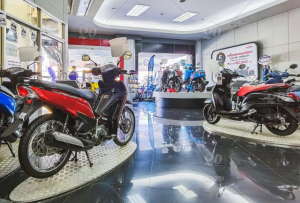
The advantages of getting a new bike are pretty obvious:
The Bike is new and in sound mechanical condition The Bike is under Warranty The place you buy will become your mechanic The Bike shop will take care of your Transfer of Ownership (Greenbook)
The only real disadvantages are that as a foreigner it is almost impossible for you to get finance and so you will have to be a cash buyer. Dealers make almost all their profits from the finance deals that most Thai's use to buy their bikes and consequently the dealer will not be making much if any profit out of you and so don't expect any significant discounts.
Red License Plates
When you buy your new vehicle, you will be issued with a temporary Red License Plate. You are only allowed to use this plate for up to a maximum of 30 days and they come with a number of limitations, most notably being that you cannot use the vehicle after dark, and you cannot leave the province or zone the plate was issued in.
The vehicle then needs to be fully registered within the next 30 days or you can be fined up to 10,000!
This situation is much less of a problem these days as the registration is now mostly done in a couple of days, whereas a few years ago this could take up to 6 months.
Buying Secondhand
Buying secondhand is how most people get their bikes. It is considerably cheaper and not really that much extra work. Apart from the obvious giving the bike a once over for problems, the main thing you need to watch out for is the bike not having a Greenbook. While this could mean that the bike was stolen, it is also pretty common for Thai's to buy and sell bikes without bothering with the “Official Channels” just because they can't be bothered. So always make sure that you get your Greenbook.
Buying Old Big Bikes
There is one extra problem if you are looking at older Big Bikes. Historically, up until around 10 years ago it was pretty close to impossible to get a Big Bike legally registered in the country. Consequently the enthusiastic bikers had to find interesting ways to get around this problem, which mostly resulted in acquiring the greenbook from some old legal bike and changing either the bike and/or book details to sort of match….
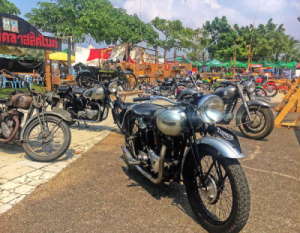
This process would mostly enable you to get through a police road block but could easily fall apart on a fully legal sale/purchase.
So be aware when looking at old bikes that while some are legally registered, a very high proportion of them are dodgy!
Documents Required
Passport
You will need to have copies of all the important pages in your passport: Info page, Page containing the current valid non-immigrant visa, Page containing the latest entry stamp, Arrival card (TM6).
Residence Certificate or Work Permit
You can get a Residence Certificate proof of address either at your local Immigration Office (Chonburi Immigration Pattaya) or from your Embassy. You will need 2 passport photos, a copy of your rental agreement or proof of address, passport, and a copy of the TM30 form with your landlord's signature (a form all hotels and apartments need to submit when taking in foreigners). You'll need to hand over signed photocopies of all the important pages in your passport too: info page, current visa, latest entry stamp, arrival card (TM6).
If you have a valid Thailand Work Permit already, the Land Transportation Office accepts this as a proof of address, so you can skip getting a Residence Certificate.
CARE!! These certificate are only valid for 30 days
When you complete the form you need to state that you require the certificate for a motorbike purchase.
As ever you should have two copies of every document signed and dated.
Transfer Process
It is strongly recommended that you always complete the purchase/sale with both parties present at the local Land Transport Office. There are often issues but these can be sorted out fairly quickly if both parties are present with the whole process normally only taking between one and two hours.
The vehicle needs to be present at the transfer so that it can be inspected and the serial numbers checked.
Once at the Land Transport Office (Banglamung Provincial Transport Office - Pattaya) you will need to present all your documents (both buyer and seller) get and complete the Ownership Transfer form which both the buyer and the seller need to sign. The official will then check these documents then return them to you. (More often as not at this stage if you are buying from a Thai they will have to go and pay any outstanding Tax due on the bike - Many Thai's invariable don't bother with paying this normally)
You then take the bike to the Motorbike Check and give your documents to the staff there and wait.
The official will check the bike with the documents which they will then take to the office.
Your papers will be returned to you with the seal of approval (your motorbike is safe). Take your bike and park in in the parking spots.
Go back into the Office to the receptionist.
They will give you a queue number and you wait until your number comes up on the electronic board with the counter number to go to.
Hand over all your papers and wait while they are checked.
When checked and signed pay the fee (about 200 baht).
The official will give you a queue number and tells you when to come back (usually between 13:00 and 16:00 or sometimes the next day).
At the appointed time (later that day or the next) go to the receptionist and show your number. They will send you to the counter where you will receive the green book with your (the Buyer's) name entered.
That's it, you are now the owner of a motorbike.
Normally this is when you should complete the deal with the seller and hand over the money. This should not be done any earlier as you never know what problems may arise. There are so many stories of honest legitimate sales going wrong because of some minor problems with the documents, not to mention the stories of less than legitimate sales!!!
TIP: Provided you have all the required documentation, if you are at the Pattaya Land Transport Office the girls in the Photocopying shops across the road will for a reasonable fee handle the whole process for you while you sit and have a Coffee. While they do go through the whole same process, they are able to jump most of the queues and get the whole thing done much quicker.
Province Change
Motor vehicles in Thailand must be registered in your name and your current address, and they must also be registered to the province of your current address. You can see this on the number plate - at the bottom for cars and in the middle for motorbikes. While you can use your vehicle all over the country, you are still meant to transfer the registration to the province you live in.
While people can and do drive around for years and have no problems without bothering to do this, it can and does occasionally cause a problem, with the police having the worst case option of confiscating your bike! Strangely enough you never hear about this with a 20 year old Honda Wave, but only if you are riding something nice. Also this is not often a problem for "Poor Thai's" but much more of an issue for "Rich Foreigners"!
TIP: There are some excemptions for vehicles registered in Bangkok due to it being the Capital but as with everything, they are a bit hit and miss when out on the road and you get stopped.
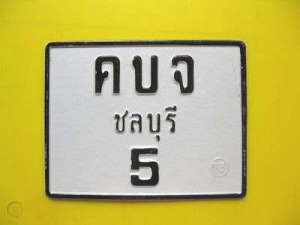
The transfer process is fairly easy but takes around a week and two trips and involves a bit of travelling.
This process can only be done at the Main Land Transport Office of the province, so in Pattaya this must be done in the Chonburi Land Transport Office.
Transfer Process
First you need to get the vehicle transferred into your name and current address as described above. This is normally done in the sellers province (Which should be where the bike is registered)
Once that process has completed (Probably best to wait at least a week to allow the paperwork to catch up) you need to take the greenbook to Your Province's LTO (Chonburi) and apply for the transfer. Once checked and completed they will then tell you to come back in around 5-7 days later.
So the following week you go back and they will inspect the bike. You then remove the plate - TIP: You have to do this yourself so bring some tools - and take it to the office where they will give you your updated Greenbook and a new Number plate.
It's best to take the bike for both trips just in case they decide to inspect the bike on the first trip!
Tax/Insurance
Every year you need to get a new Tax Sticker and Insurance for your bike, also if older than 3 years they will need to check the brakes, lights, exhaust fumes and exhaust decibels.
TIP: The testing process is generally pretty straight forward for most people most of the time, however it should be noted that you are not allowed to make ANY changes to your motorbike without notifying the Land Transport office so that they can check it out and then reflect these changes in your Greenbook. Needless to say this regulation is widely ignored, and even if you do try to follow this process and get your changes verified at the Land Transport Office, they will not be interested and tell you to bugger off.
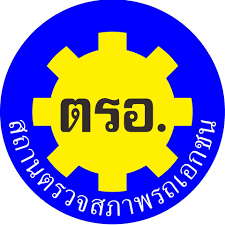
BUT, this does mean that when they feel like, they can choose to fail your bike at the test centre (There are many stories about one particular "foreigner hating" tester at the Phuket LTO), or the Police can choose to fine you if they happen to stop you and notice something.
In practice, this mostly only happens with extra Loud aftermarket exhaust pipes or if you piss them off for some reason. Just something to be aware of.
This process is no longer actually done in the Land Transport Office but in one of the many test centres that have recently been popping up all over the place.
All you need to take is the bike and your Greenbook to the test centre. Here they will test the bike if necessary, take your details and charge you the relevant fees - around about 5-600 for a small scooter. You then go back 2 days later and they will return your Greenbook along with a new Tax Sticker and the mandatory Government Insurance note.
This insurance is only third party but sufficient for most people's needs unless you have a proper big bike in which case you will probably want to sort out your own insurance with a local broker.
TIP: If you are in a hurry you can get this all done at the Test centre that is beside the Pattaya Land Transport Office. Same process and price as everywhere else, but it is all done within the hour.
Copy of Greenbook
Once you have everything it is a very good idea to keep a copy of your Greenbook, Tax sticker and Insurance Note in the bike at all times. You can easily get laminated copies in any of the copier shops (Kodak), this makes things so much easier as often when the traffic police stop you along with asking for your driving license, they also sometimes ask for the Greenbook, Tax Sticker and your Insurance Note.